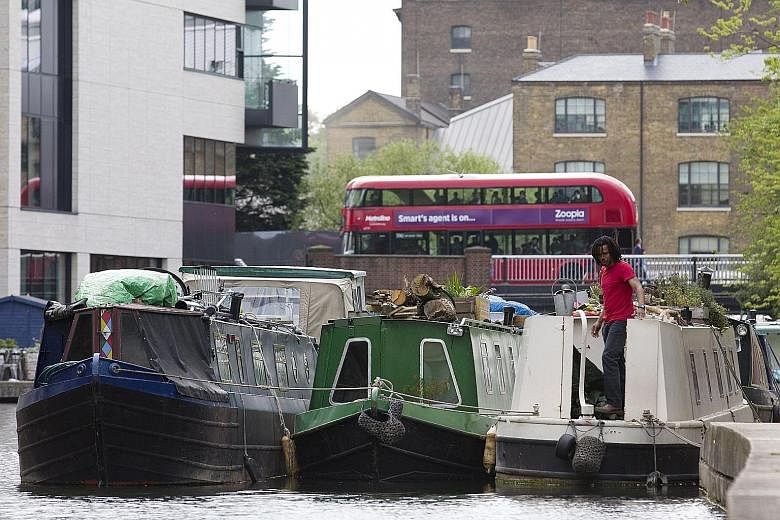LONDON • Rocketing housing costs in Britain's capital have fuelled a surge in Londoners seeking cheaper accommodation on boats, with the increased numbers putting pressure on the city's historic network of rivers and canals.
The picturesque lifestyle of sleeping in a colourfully painted narrowboat or barge can seem tempting, especially when buying one can cost a fraction of the price of bricks and mortar.
"It's become more common for people to do it who don't know what they are getting into, or even because they have no choice," said education worker Jim Bryden, 39, who has lived aboard a boat with his girlfriend, a dog and a cat for two years.
"I've met people who have ended up on a boat because they had two weeks' notice to leave their flat and were able to buy a boat for £10,000 (S$21,000)," he said.
Everyone has a story of spotting newcomers struggling with engine failure, steering ineptly along a crowded canal or having regrets once facing a damp, cold winter on boats often heated by just a stove.
Maintenance costs can mount quickly and boaters dryly refer to their vessels as "black holes" for cash, constantly in need of repair.
Yet even more expensive boats, which can cost more than £100,000, are still a fraction of the average London house price of £500,000.
One boat has entered the London waterways for every working day in the past year, with popular areas seeing an 85 per cent spike in numbers, according to the Canal and River Trust (CRT), which manages 3,200km of a network that spans Britain, much of it built to carry freight in the Industrial Revolution.
The increased numbers have caused congestion, with fierce competition for mooring spaces, queues at locks and friction with nearby residents who suddenly find themselves with a large and shifting cast of new neighbours in boats moored two or three abreast.
Along one central London stretch of Regent's Canal, the boat dwellers maintain special rules to appease nearby residents, who launched a series of complaints to the authorities over noise and smoke disturbing them in their expensive terraced homes that line the canal.
Yet an attempt by the CRT to tackle congestion has caused an outcry in the boating community. Many boats have "continuous cruising" licences, which require them to move every 14 days rather than stay in a permanent rented mooring spot, which can cost the same to rent in London as an apartment.
In spring, the CRT began an enforcement drive on continuous cruisers, warning that it will refuse to renew licences or remove boats that it deems do not move often or far enough along the waterways.
Almost 20,000 people signed a petition against the drive, calling on boaters to mobilise to "prevent the eviction of boat dwellers" and accusing the CRT of pushing families into homelessness.
"Like it or not, socio-political realities have made the waterways an affordable housing resource for many families," the petition says, accusing the CRT of a "marked hostility towards the water-based community" and targeting people with no where else to go. AGENCE FRANCE-PRESSE

